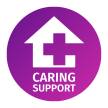The Importance Of Self-Care At Work - A Conversation With Cathy Alvarez
The Importance Of Self-Care At Work - A Conversation With Cathy Alvarez

Have you ever wondered how you can do self-care while at work? This week, the Caring Support Podcast got the chance to sit down with Cathy Alvarez, Nurse and co-founder of Replenish at Work, a nurse-led program that inspires and motivates nurses to prioritize their health and well-being. Come with us to learn more about this amazing program and how you can make sure you are taking care of yourself while on the job.
Tell Us About Yourself.
My name is Cathy Alvarez. I live in the United States in Connecticut. I've been a nurse for over 20 years in a variety of different fields. Started off in progressive care, cardiac nursing, found myself struggling to manage the workload, family life, and things like that and thought about leaving the nursing profession early in my career. But fortunately, I found a program on holistic nursing, and holistic nursing focuses on self-care for the nurse, self reflection, we're only as good to our patients as we are to ourselves. It really changed my nursing trajectory.
After becoming board certified in Holistic Nursing, I then became a nurse manager and was practicing what I preached about supporting my staff's well-being throughout the work day. As a result, my staff had a really good engagement. We had a really low turnover, and patient satisfaction scores were great, which then led me into thinking: “well, there's something about this. What else can I do?” So I moved into nursing education and was doing retreats at the hospital I was working for called Nurture the Nurse retreats, supporting nurse well-being, self-care and then transitioned from that into having my own business called Replenish at Work, which is co-founded with my business partner Pam Mulligan. I've been in a variety of different nursing roles from management to education, but my heart and soul are into helping and supporting nurses and health care providers to take care of themselves at work.
What Inspired You To Create The Replenish At Work™ Program?
The Replenish at Work Program is like a rapid response approach to nurse or caregiver well-being. The theory behind it was both Pam and myself had struggled with emotional exhaustion, what we thought was burnout at the time. We wanted to help support nurses by utilizing the tools that we had learned. I have a background in education. Pam has a background as a nurse but is also an integrative health coach. We wanted to combine a little bit of content and coaching to help support nurses, but what we realized, both being nurses, is that many organizations are supporting well-being. They're trying to have rejuvenation rooms that nurses can go to with a massage chair or have yoga at this time during the day, or you can call in for a meditation. Let's be honest, a lot of nurses can't do it and if they don't value self-care, they don't really understand what it is and that we're worthy enough. They're not going to go to that room.
What we do with Replenish at Work is it's a rapid response on the unit approach to nurse well-being. Simple tools and practices that nurses can identify what they need to be well and engage in while at work, because we know as nurses, it's really rare if we eat, drink, go to the bathroom in 12 hours. Many of us think that’s self-care but eating, drinking, going to the bathroom are basic human needs. We wanted to identify quick micro restorative practices that nurses can engage in, self-identify what they need to be well, because we all know meditation is good for you, yoga is good for you, but if it's not meaningful to you, you're not going to engage in it.
How Important Is Self-Care At Work?
Self-care is so important at work and I think self-care over the course of the past couple of years has gotten a bad rap, because when we think self-care, you think I'm going to go get a massage or a pedicure, and those are really great, but you feel great in that moment then the next day your back doesn't feel as good, right?
I think we have to reframe how we're determining the words self-care. I think that self-care can be as simple as saying ‘no’, it can be as simple as saying, ‘I need help right now at work’, ‘I'm drowning’, ‘I have a lot of things going on’, ‘Can somebody help me?’ I think we have to re-term, reframe the terminology of self-care. I want to care for myself, but we need to self-reflect on what we need. How does that look at work?
Pam and I have what's called a need assessment and it's just three simple questions you can ask yourself during the day. The challenge is you have to get present enough, because oftentimes we're running, we're multitasking, we're mindlessly going through work. A lot of what we talk about is: how can we become more mindful during work? You're not going to sit and do a meditation right away because that's not going to be possible, but how can I just quickly get into my body to be present to identify what I need? Then when I identify, what do I need? It's individual to me and I can go and I can do that. It could be something as simple as, okay, I realize I need a drink of water or my back is bothering me, I might need to stretch or I just had a really difficult encounter that I need to acknowledge with some self-compassion that was really difficult. Maybe I need to call somebody or talk to somebody on the unit. It's really important and it's individualized.
What I like to think of as the easiest, simple self-care practice that anyone can start infusing right now is to think about how many times you disinfect your hands with either the Purell sanitizer or hand wash. You're doing that millions of times during the day as a nurse, so that always, even before a patient encounter, is a quick moment to just slow down as you're feeling the hand wash on:
- Okay, I'm checking in.
- Maybe I take a breath.
- How am I feeling right now in this moment?
- Maybe what is my emotion?
This goes back to emotional intelligence, which I'm big on too. That's one of our key pillars that we teach: how am I feeling? What is my emotion? What do I need right now to be well? How is my physical body? Once we've identified how I am, what I need, okay, I can engage in something. Maybe it's as simple as stepping into the stairwell and just breathing for 2 minutes. I tell nurses, a lot of times you don't have a half hour to go meditate or to do these things. What can I do? Maybe it's I go into the break room and I hit my timer on my phone for a minute and I just I'm just there and I'm present and I'm focusing on my breathing. It's individualized, which is what I think is different about our program as opposed to other programs. It's you as the individual, know what you need to be well, I can tell you, I can offer you options, but only you know what you need. So how can we get you to a space, to one, identify what you need and two, be okay with giving yourself permission to engage in something quickly to restore.
Can You Tell Us About One Of Your Most Impactful And Memorable Cases Where Your Replenish At Work Program Was Successful?
I think the first time Pam and I got together to pilot this, we were at Yale-New Haven Hospital, which is one of the largest hospitals in the Northeast, and we were in the Cardiac Thoracic ICU. So CTICU, surgery, high intensity. Patients are very sick, the sickest patients in the hospital, and we were asked to go in because the staff was really experiencing a lot of stress, moral injury, turnover, and it was really rewarding because we really just brought them in for 15 minutes.
We brought them in. Got them present. How are you feeling? What do you need? Some of them just needed water. Some of them were saying, My back is bothering me, I really just need to stretch. but what was impactful about that is we noticed that their perceived stress levels went down, but the most important thing was that they felt that they were being heard. They felt that administrative cared about their well-being to have somebody like Pam and I come in to not only allow them the space to think about what they need, but to make it okay for them to talk to us about what their challenges are and what they need as far as a unit to engage in self-care.
It was just impactful because the nurses were just so thankful. They felt like the administration really cares about their well-being. Pam and I, we're both nurses and she comes from a transplant procurement ICU background and I have progressive care background, with both of us being nurses we completely understand the needs of our peers. We can form these connections with one another that other people can't because we're peers on a level where we understand and we can support you.
Is Your Replenish At Work Program Available To Canadian Organizations? How Can They Contact You Or Do You Come Up Here? Have You Worked With Canadian Companies Before?
We're available anywhere. The beauty about our program is we can travel and do things live in person. We can also host programs live on Zoom and are working on the options of recorded programs that can be embedded into LMS systems. Interestingly, Pam, my business partner, is from Canada. She's around the Toronto area where she's originally from. We are open to any avenue of nursing, even to health care providers. It's not just strictly nursing as well. Our goal is to help healthcare professionals take care of themselves. You can reach out and contact me via [email protected] , you can also DM on our social networks as well and we also have a scheduling page link on our website: www.ReplenishAtWork.com .
Is There Anything Else You Would Like To Share With Us Today?
Just speaking to fellow nurses and health care providers, I think there's a lot coming out about all the system changes that are needed. There are a million system changes that are needed in health care, but system changes, as we know, take time. In the meantime, what can we do? I think we need to realize that we're only as good to our patients, our family members, our coworkers as we are to ourselves. If you can do one thing today, one thing to slow down, think about just slowing down, assessing what you need and engage in something, even if it's for a moment, because you'll feel better. Once you feel better, you get that intrinsic motivation to change and sustain caring for yourself at work.
About Cathy Alvarez
Cathy Alvarez has over 20 years of nursing experience in the fields of progressive care, holistic nursing, leadership, and education development. After experiencing burnout early in her career Cathy developed a passion for designing and implementing education programs that specifically focus on self-care, self-reflection, mindfulness, and resiliency for nurses. Her experience in curriculum development combined with her knowledge of evidence-based integrative wellness practices led her to co-found, Replenish at Workä, a nurse-led program that inspires and motivates nurses to prioritize their health and well-being. The Replenish at Workä framework guides participants to self-assess a NEED and embed quick and practical micro-restorative habits into the workday. The program is offered on-site, virtually, and a self-guided module is in development. All phases can be tailored to meet the needs of an individual or group. To learn more about Replenish at Workä, please visit replenishwork.com or email her directly at [email protected] to book an informational call.
About Replenish At Work™ Program
Replenish at Work™ is a program designed to provide an “in the moment” rapid response approach to nurse and healthcare provider well-being. Our integrative approach guides individuals and teams to be genuinely in touch with their needs, identify stressors, and create a vision for healthy change that positively impacts their personal health and promotes the health and well-being of the work environment.
We have been working with practitioners and building programs for the last 15 years to support nurses in their complex often overwhelming environments. Today, you cannot talk, read, or listen to anything about healthcare, that doesn’t include the topic of health care workers in crisis particularly nurses and physicians. The level of moral distress and emotional exhaustion calls for a greater urgency to facilitate a culture shift and re-imagine how we can sustain compassionate care. At Replenish we believe this is through easy access to resources and personalized support.
Source: https://www.caringsupport.com/blog/importance-of-self-care-at-work






Comments
Caring Support is not accepting comments at the moment
Want to show your support? Send them a one-off tip.